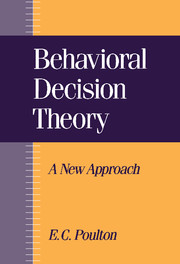
-
Select format
-
- Publisher:
- Cambridge University Press
- Publication date:
- 06 July 2010
- 30 September 1994
- ISBN:
- 9780511574894
- 9780521443685
- Dimensions:
- (237 x 160 mm)
- Weight & Pages:
- 0.64kg, 336 Pages
- Dimensions:
- Weight & Pages:
You may already have access via personal or institutional login
Book description
This book discusses the well known fallacies of behavioural decision theory. It shows that while an investigator is studying a well-known fallacy, he or she may introduce, without realizing it, one of the simple biases that are found in quantifying judgements. The work covers such fallacies as the apparent overconfidence that people show when they judge the probability of correctness of their answers to two-choice general knowledge questions using a one-sided rating scale; the apparent overconfidence in setting uncertainty bounds on unknown quantities when using the fractile method; the interactions between hindsight and memory; the belief that small samples are as reliable and as representative as large samples;; the regression fallacy in prediction; the availability and simulation fallacies; the anchoring and adjustment biases; and bias by frames. The aim of this book is to help readers to learn about the fallacies and thus to avoid them. As such, it will be useful reading for students and researchers in probability theory, statistics and psychology.
Reviews
"This work represents a major contribution to methodology in the study of human decision making....The book is an outstanding piece of scholarship. It is thorough and authoritative. It provides an original, penetrating, cogently-argued, challenging re-analysis and re-assessment of many of the most infuential studies in the field of human judgement....it throws light on apparent conflicts and paradoxes in the literature and it provides students and researchers with many helpful insights that will enable them to optimise the design of experiments on human judgement....this book looks set to become a standard reference work for students and researchers in the field of human judgement." Raphael Gillett, Applied Cognitive Psychology
"The book is well organized, with separate chapters devoted to each of the major biases....The author has incorporated several reader-friendly devices, such as chapter summaries, as well as sections in all the major chapters on practical examples of the bias described in the chapter and how to avoid it. The helpfulness of these sections varies greatly: Poulton does an excellent job of depicting the dangers that availability can lead to in clinical diagnosis....Poulton emphasises the limitations of behavioral decision research....Because of Poulton's methodological bent, he dissects key experiments- especially Kahneman and Tversky's seminal research-in more detail than do other introductory texts." Applied Cognitive Psychology
Contents
Metrics
Altmetric attention score
Full text views
Full text views help Loading metrics...
Loading metrics...
* Views captured on Cambridge Core between #date#. This data will be updated every 24 hours.
Usage data cannot currently be displayed.
Accessibility standard: Unknown
Why this information is here
This section outlines the accessibility features of this content - including support for screen readers, full keyboard navigation and high-contrast display options. This may not be relevant for you.
Accessibility Information
Accessibility compliance for the PDF of this book is currently unknown and may be updated in the future.


